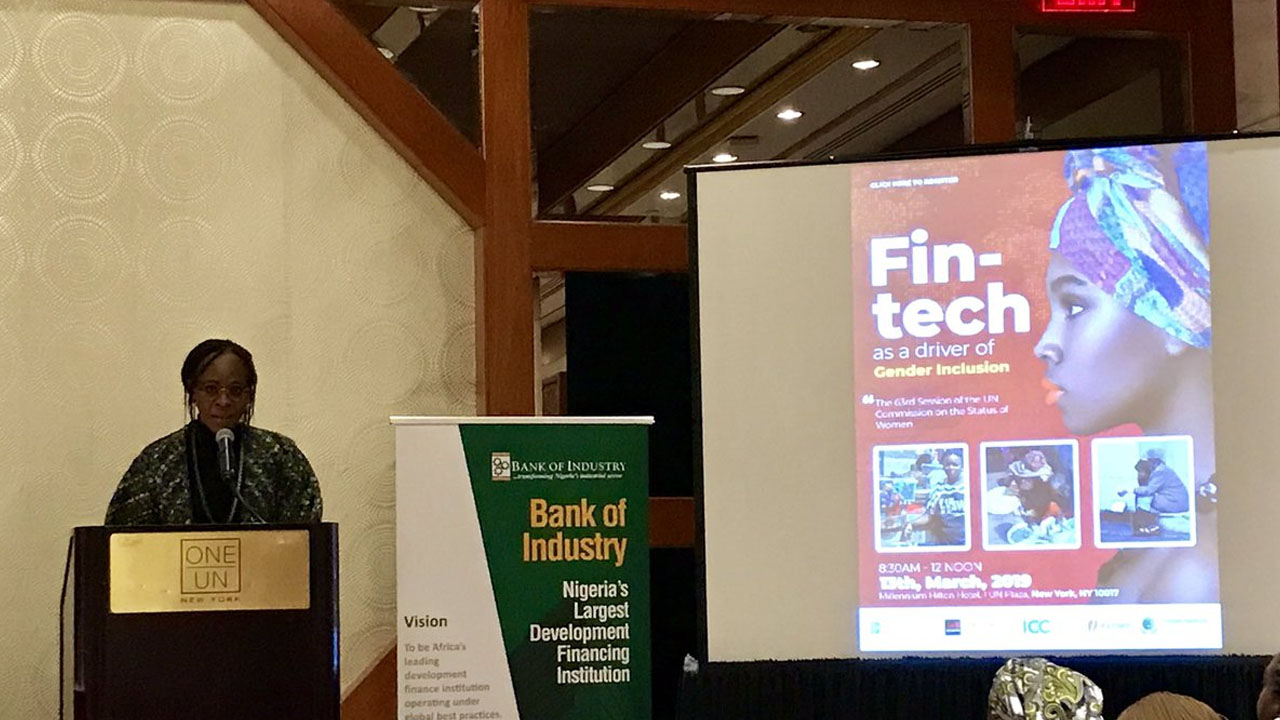Micro credit interventions by the Federal Government has been applauded by the International community as over 300,000 thousand beneficiaries have been recorded on its TraderMoni and GEEP programs recently.

Speaking at the 63rd UN Commission on the Status of Women, the Executive Director of the Micro Enterprise Division of the Bank of Industry, Mrs Toyin Adeniji delivered a presentation which showed how GEEP is being deployed using technology and how beneficial it has been for empowering women who make up about 53% of beneficiaries across the various GEEP products.
According to her, the goal to provide financial inclusion for all Nigerians regardless of social class and economic status has made giant strides across the country as countless traders, artisans and farmers continue to laud the Federal Government for giving them a way to access credit for their businesses through the Government Enterprise and Empowerment Program (GEEP).
The singular vision for GEEP has been to use its various economic empowerment products to take financial inclusion down to the grassroots, considering how invaluable the contributions of petty traders, artisans, and other trade types are to economic development.
Their inability to get loans through traditional banking means has only served to show the importance and usefulness of the various GEEP products in order to spur an increase in income generation for this demographic.
The added benefit of these loans being interest & collateral free and requiring just a mobile wallet/BVN is a testament to the Federal Government’s commitment to removing all barriers to financial inclusion.
The first phase of the roll out of various GEEP products has seen Tradermoni reach over 1.2 million beneficiaries while Marketmoni has reached over 350,000 beneficiaries.
So far, the program targets 30,000 beneficiaries per state and the Federal Capital in the first phase of the TraderMoni roll out, and the GEEP team seem poised to fulfill its mandate with successful ramp ups across 10 states (Abia, Adamawa, Bayelsa, Borno, Ebonyi, Edo, Ekiti, Enugu, Imo & Kebbi).
The market activations in these states have allowed another 30,000 new traders come onboard the program as they take the first step towards boosting their businesses through GEEP.
Speaking on how GEEP is using technology to scale, Mrs. Adeniji explained that GEEP does not use paper-forms. Beneficiaries are registered via mobile forms on tablets and mobile devices. This enables real-time data quality check and verification and ensures that there are no errors in input and consequently, in interpretation.
The complete elimination of paper-based registration has enabled the program scale fast; registering over 7m micro enterprises in less than 2 years.
Furthermore, through data integration with multiple third-party data sources, GEEP is able to immediately validate over 43 data points for each beneficiary including but not limited to facial recognition, BVN, and store location.
In addition to the foregoing, Mrs Adeniji explained that TraderMoni disbursements are made to beneficiaries via mobile wallets, thus, allowing last-mile credit delivery to recipients in the most rural areas. This is in addition to working with an agent network of over 4,000 persons that are monitored with technology using geofencing.
GEEP also uses technology to drive repayments; working with the Central Bank of Nigeria (CBN), and the Nigeria Interbank Settlement System (NIBSS), GEEP implemented the first successful application of the BVN as a digital collateral.
The presentation was made during a side event – FinTech as a Driver of Gender Inclusion – hosted by the Bank of Industry in partnership with Eyowo, Ford Foundation, GSMA and the International Chamber of Commerce (ICCWBO). This event was a major part of the UN’s Global Compact initiative which brought together over 600 business leaders and stakeholders to promote gender equality and women’s economic empowerment.
The Nigerian delegation which also included the SA to the President on NSIP, Mrs Maryam Uwais highlighted that over 53% of GEEP beneficiaries were women.
Nigeria was commended on its laudable efforts in driving financial inclusion and access to affordable credit via Social Investment programs like GEEP.














